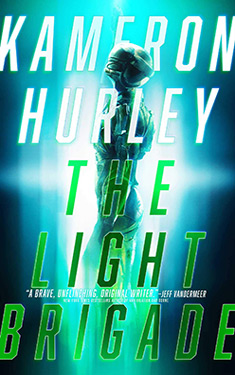Kameron Hurley
Completed 5/19/2024, Reviewed 5/20/2024
4 stars
Nominated for a 2020 Hugo Award, this novel was a departure for me. It’s an intense military SF novel with time travel thrown in. Unlike The Forever War, which had relativistic time dilation, or Starship Troopers, which was a love letter to militaristic society, this book was a basic “War is Hell” story in a world of corporate control. Governments no longer run countries. There are just six mega-corporations that control everything. The armies are corporate controlled and the war is against the democratically governed Mars emigrants from Earth who have no corporate rule. It takes late-stage capitalism to its extreme and explores the extent to which it will go to preserve itself.
The corporations have perfected something like Star Trek transporter technology, breaking down soldiers into light and sending them at the speed of light to their battle assignments. Some soldiers, known as the Light Brigade, have completely different memories of where they were sent compared to the rest of the squad. They are studied by the corporations and grounded, or killed. Dietz is one such soldier. As the book unfolds, we find that Dietz is actually jumping in time, being sent to past and future assignments, and finding out who in their platoon is getting killed in battle and who survives. Dietz never reveals the condition to the corporate medical or psychiatric team, keeping the details secret. But after numerous jumps through time, begins to put together the truth of the Martian war.
If you noticed, I never used a gender pronoun for Dietz. That’s because the book doesn’t make that clear until the end of the story and I won’t give it away. It’s an interesting conceit, particularly because the soldier is bisexual. But that’s not the point of the story. Dietz is an angry young person. Their family members were not citizens and had no privilege. Dietz’s father disappeared because of the corporation they were residents of. Dietz’s mother died with no healthcare because they weren’t citizens. She encouraged Dietz to become a soldier to earn citizenship. Dietz is also angry because the rest of the family, including extended members, were killed when the Martians bombed Sao Paolo into a giant crater. Now, as a soldier, Dietz questions the decision to fight in the war for the corporation.
The travel by light is no where near perfected. Besides the experiences of Dietz and the Light Brigade, there are also major mishaps in this mode of transportation. Some soldiers are mutilated by the process. So if you don’t die in battle, you may die getting there or coming back. It’s an extremely dangerous career, being a soldier, and the corporations train out almost every instinct of self-preservation one has. It brainwashes them into super killing machines, willing to die in whatever way death comes for the honor of the corporation.
I really liked the characterization. Dietz is the narrator. Whether you like Dietz’s personality or not, you completely empathize and understand their thought processes. Many of the secondary characters are standard fare for military SF, or military fiction in general. But I found myself buying into them as more dimensional than they really are. Think of the stereotypes of soldiers in “Aliens.” They were all caricatures, but all very believable. Same here.
The writing is intense as well. As we are in Dietz’s mind as narrator, the prose is angry and crisp. There is no flowery language. It’s war and it’s brutal. Still, I felt I had great pictures of all the characters. The world building was amazing. Whether the troops were fighting on Mars or on Earth, the images of the locals and the carnage there were amazingly vivid.
I give this book a solid four out of five stars. It’s a nearly perfect military SF novel. It doesn’t paint a rosy picture of heroes and winning. It’s about the truths of war and the machine that keeps it going. I’d actually like to read some David Weber to compare and contrast his military SF with what I’ve read, despite not really liking the subgenre. But that’s somewhere down the road. I’m glad I read this book, which was an online book club selection. So far, I’m two for two with Hurley’s books, having enjoyed God’s War about five years ago.

No comments:
Post a Comment